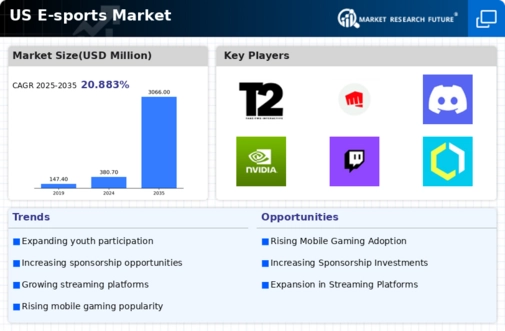The e sports market in the US is characterized by a dynamic competitive landscape, driven by rapid technological advancements and an increasing consumer base. Major players such as Activision Blizzard (US), Riot Games (US), and Epic Games (US) are at the forefront, each adopting distinct strategies to enhance their market presence. Activision Blizzard (US) focuses on expanding its portfolio through innovative game development and strategic partnerships, while Riot Games (US) emphasizes community engagement and competitive integrity, fostering a loyal player base. Epic Games (US) leverages its Unreal Engine technology to create immersive gaming experiences, positioning itself as a leader in digital transformation within the industry. Collectively, these strategies contribute to a competitive environment that is both collaborative and fiercely competitive, as companies seek to capture the attention of a growing audience.
Key business tactics employed by these companies include localized content creation and supply chain optimization, which are essential for meeting the diverse preferences of gamers across different regions. The market structure appears moderately fragmented, with several key players exerting considerable influence. This fragmentation allows for niche opportunities, enabling smaller companies to thrive alongside industry giants. The collective influence of these major players shapes market dynamics, as they continuously innovate and adapt to changing consumer demands.
In October 2025, Activision Blizzard (US) announced a partnership with a leading streaming platform to enhance its e sports broadcasting capabilities. This strategic move is likely to increase viewer engagement and expand its audience reach, thereby solidifying its position in the competitive landscape. By integrating advanced streaming technologies, Activision Blizzard (US) aims to create a more interactive viewing experience, which could attract new fans and retain existing ones.
In September 2025, Riot Games (US) launched a new initiative aimed at promoting diversity and inclusion within its gaming communities. This initiative not only reflects a commitment to social responsibility but also serves to broaden its player base by fostering an inclusive environment. By prioritizing diversity, Riot Games (US) may enhance its brand loyalty and appeal to a wider demographic, which is increasingly important in today’s market.
In August 2025, Epic Games (US) unveiled a new funding program for independent developers, aimed at fostering innovation within the e sports ecosystem. This initiative is significant as it encourages creativity and supports the development of unique gaming experiences that could potentially disrupt the market. By investing in independent developers, Epic Games (US) positions itself as a catalyst for innovation, which may lead to the emergence of new gaming trends and genres.
As of November 2025, current competitive trends in the e sports market include a strong emphasis on digitalization, sustainability, and the integration of artificial intelligence (AI) into gaming experiences. Strategic alliances are increasingly shaping the landscape, as companies collaborate to enhance technological capabilities and expand their market reach. Looking ahead, competitive differentiation is likely to evolve, shifting from price-based competition to a focus on innovation, technology, and supply chain reliability. This transition suggests that companies that prioritize these aspects will be better positioned to thrive in an ever-evolving market.























Leave a Comment